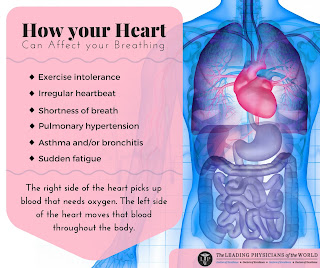Heart Can Affect Breathing
The heart
and lungs work together to keep a person alive. The heart pumps blood, which
has been oxygenated by the lungs, to the rest of the body. The heart and lungs
also need an oxygen-rich blood supply to function properly. Breathing problems
are often associated with heart disease because of this close relationship
between the heart and the lungs.Several heart problems are related to
breathing, according to MedlinePlus.
1.
Arrest
If the
lungs stop functioning, it is called respiratory arrest, and the heart
eventually stops too. Conversely, if the heart stops, it is called cardiac
arrest, and the lungs also cease functioning. There are several causes of
respiratory arrest, such as apnea, suffocation or lung disease.
2.
CHF
Congestive
heart failure, or CHF, can affect breathing and shortness of breath is a major
symptom of CHF. CHF is a condition where the heart cannot pump blood to the
other organs, according to the American Heart Association. The patient begins
to breathe heavily as the lungs try to supply the body with more oxygen. In
addition to carrying oxygen to the cells of the body, blood also carries away
toxins and excess fluid. CHF causes fluid to build up in different places in
the body, including the lungs. This worsens breathing problems, causing the
blood to be even less oxygenated.
3.
CorPulmonale
Corpulmonale
is a heart condition caused by high blood pressure in the artery that moves
blood from the heart to the lungs. High blood pressure in this artery is called
pulmonary hypertension, and prolonged pulmonary hypertension puts strain on the
heart. When the right ventricle of the heart is no longer able to handle
pumping against this unusually high pressure, it is called corpulmonale. Almost
any chronic lung disease can lead to corpulmonale, including COPD, apnea and
cystic fibrosis.
4.
Arrhythmia
The heart
speeds up for a few beats while a person inhales and then slows down as the
person exhales. This is known as sinus rhythm and is normal. An abnormal heart
rhythm is known as arrhythmia which can cause shortness of breath. About 4
million people in the United States have arrhythmias, according to Texas Heart
Institute.
5.
Heart
Attack
A heart
attack occurs when blood vessels to the heart are blocked, preventing
oxygen-rich blood from reaching the muscles of the heart. The cells in the
heart muscle are injured by the lack of oxygen and may begin to die. Shortness
of breath is a symptom of heart attack.
6.
Congenital
Disease
A person
may be born with a medical condition. This is known as a congenital disease.
Certain congenital diseases may affect the heart and interfere with breathing.
Congenital heart disease is the most common congenital disease and is
responsible for more deaths in the first year of life than any other congenital
disease.
The close
connection between the heart and lungs means that breathing problems can be
caused by issues in either the heart or lungs, or both. Pay attention to
breathing and heart functions. Remember that both the heart and lung can be
sources of breathing problems. See the doctor when something does not seem
right.





Comments
Post a Comment